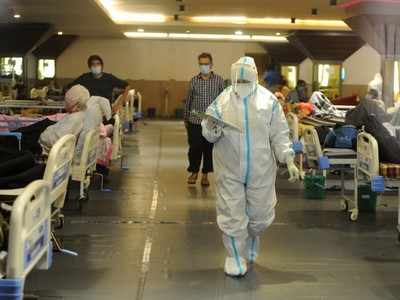
Representative image
A virus variant that has been spreading rapidly in India and designated a variant of concern by the World Health Organization (WHO) might be more contagious than most versions of the coronavirus, the agency said in a report it published on Tuesday evening.
The WHO emphasised in its report that it wasn’t yet clear how much the variant, known as B.1.617, had contributed to the devastating surge that has crushed India in recent weeks. It cautioned that India, like many countries, is only sequencing a tiny fraction of positive samples, and that with so little surveillance, it’s difficult to reach any firm conclusions about B.1.617.
Religious events, poll rallies fuelled surge, say experts
The WHO study comes amid calls for nationwide restrictions in India to try to limit the death toll, as hospitals are overrun and crematories burn nonstop. Experts also caution that it is not yet clear just how much of a factor B.1.617 has played in the explosion of cases in India. They point to a perfect storm of public health blunders, such as permitting enormous political rallies and religious festivals in recent months. It is possible that the variant is being lifted up by the surge, rather than the other way around.
The WHO speculated that another variant known as B.1.1.7, first identified in Britain and now dominant in the US, might also be driving the swell in cases. It’s not yet clear whether B.1.617 causes more severe Covid-19. But until more genetic sequencing is done, it is impossible to know if the variant is to blame. Stacia Wyman, a genomics scientist at the University of California, Berkeley, said the WHO had made the right decision. She pointed to the fact that the variant had already spread to at least 49 countries. “This appears to be posing the biggest threat right now in terms of transmissibility, with many countries reporting increasing trajectories of the B.1.617 variant,” she said.
B.1.617 first came to light in October 2020. It had a number of mutations, some of which have been proved worrisome in other variants. Other mutations could make it more difficult for antibodies produced by infections with other variants to stick to them. Studies on antibodies produced by vaccinated people also suggest that they work less successfully against B.1.617.
WHO researchers determined that B.1.617 is spreading fast in India, making up over 28%% of samples from positive tests. The shift suggests that B.1.617 has a higher growth rate than other variants circulating in India, with the possible exception of B.1.1.7. Virologist Gagandeep Kang said there was not enough data to conclude whether either variant was contributing to India’s deadlier second wave. Based on reports from hospitals, Kang said it appeared that B.1.617 was causing more severe disease but that, again, there was insufficient data to draw conclusions.
FacebookTwitterLinkedinEMail


